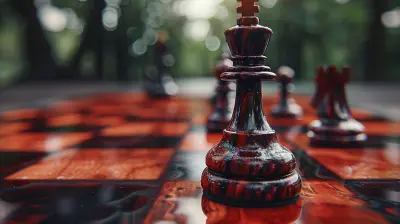The Cultural Impact of Iconic Puzzle Games
6 April 2025
Puzzle games, those little gems of ingenuity, have been around forever, right? From ancient board games to that addictive mobile game you can't seem to delete, they've quietly shaped the way we think, play, and even socialize. But have you ever stopped to wonder just how deep their influence runs? Let me tell you, puzzle games are so much more than just a way to kill time—they’ve left quite the mark on culture, entertainment, and even how we see ourselves.
![]()
A Brief Glimpse into Puzzle Game History
Before we dive into their cultural impact, let’s take a quick step back. Puzzle games have ancient roots. Remember the Rubik’s Cube? Well, even before that, people were solving puzzles like tangrams in China or sliding tiles in early mechanical contraptions. Fast forward to the digital age, and you’ve got classics like Tetris, Minesweeper, and Bejeweled taking center stage. These games didn’t just entertain us; they rewired our brains and shaped how we interact with technology.![]()
Tetris: A Global Phenomenon
Speaking of classics, we can't talk about puzzle games without bringing up Tetris. Originally created by a Soviet programmer, Alexey Pajitnov, in 1984, this simple-yet-addictive game took the world by storm. I mean, stacking falling blocks? Who knew it could be so engaging? But Tetris did more than just give us endless hours of entertainment—it became a cultural icon.In the late '80s and early '90s, Tetris was bundled with the Game Boy, making it the first puzzle game to go truly global. Everyone, from kids on the playground to their parents, was trying to beat their high scores. It wasn’t just a game; it became a shared experience. Even the soundtrack—those catchy chiptunes—has become a nostalgic time capsule. And let's not forget the psychological phenomenon known as “The Tetris Effect,” where players start seeing the world as a puzzle to solve. Crazy, right?
![]()
How Puzzle Games Connect Us
Have you ever noticed how puzzle games have this magical ability to bring people together? Whether it’s a Sudoku book shared over coffee or a heated match of Candy Crush where you and your friends trade tips, these games are social glue. Sure, they’re often solo experiences, but they have this sneaky way of creating conversations.Think about escape rooms. They’re essentially life-sized puzzle games, and they’ve exploded in popularity. Why? Because they get people to work together, solve problems, and—let’s be real—argue a little over who’s doing what. And we can’t ignore the rise of multiplayer puzzle games like Portal 2. These games don’t just challenge your brain; they forge bonds. It’s like the modern version of solving a jigsaw puzzle at the dinner table—but way cooler.
![]()
The Boom of Mobile Puzzle Games
Okay, let’s talk about the elephant in the room: mobile puzzle games. Chances are you’ve spent way too much time swiping, matching, or popping bubbles on your phone. (No judgment—same here!) Games like Candy Crush Saga, Angry Birds, and 2048 have turned idle moments into gaming sessions.What’s fascinating is how these games have woven themselves into daily life. Waiting at the doctor’s office? Candy Crush to the rescue. Long commute? Time to hit those Words With Friends invites. They’re bite-sized distractions, sure, but they’ve also redefined how we consume media. You don’t need a console or a fancy rig—your phone is your gaming gateway.
And let’s not forget the cultural memes they’ve sparked. Remember when half the internet seemed obsessed with Flappy Bird? Mobile puzzle games don’t just entertain; they become cultural phenomena, sparking trends, jokes, and even heated debates about screen time.
Puzzle Games and Mental Wellness
Now, let’s get serious for a second. Puzzle games aren’t just fun—they’re good for you. Seriously. They’re like a workout for your brain, improving memory, focus, and problem-solving skills. It’s no wonder apps like Lumosity or Brain Age have marketed themselves as tools for cognitive fitness.But there’s more to it than just brain training. Puzzle games can be incredibly relaxing. Think about the soothing vibes of Monument Valley, with its dreamy visuals and peaceful soundtrack. Or the meditative satisfaction of completing a Sudoku puzzle. At a time when life feels chaotic, puzzle games give us a sense of control and accomplishment. They’re the gaming equivalent of wrapping yourself in a cozy blanket. Who doesn’t need that every now and then?
Educational Impact: Gamifying Learning
Remember those boring math drills in school? Imagine if, instead of mindlessly filling out worksheets, you were solving a game that made learning fun. That’s the magic of puzzle games—they make even the dullest subjects engaging. Games like Minecraft: Education Edition or The Witness turn problem-solving into an immersive experience.Even traditional learning apps like Duolingo use puzzle-like mechanics to teach languages. You’re piecing together phrases, unlocking achievements, and solving linguistic “puzzles.” It’s gamification at its finest, and it works. Puzzle games are proof that learning doesn’t have to feel like a chore.
The Future of Puzzle Games
So, what’s next for puzzle games? Let’s face it—technology has opened up a world of possibilities. Augmented Reality (AR) games like Pokémon GO have already blurred the lines between real life and puzzles. What about Virtual Reality (VR)? Imagine solving intricate 3D puzzles like you’re actually inside the game. (Hello, The Room VR fans!)And with AI advancing at breakneck speed, who knows? Maybe we’ll soon have games that adapt dynamically to our skill levels or even create personalized puzzles just for us. The possibilities are endless, and if the past has taught us anything, it’s that puzzle games will continue to evolve and surprise us.
Why Puzzle Games Matter
At the end of the day, puzzle games are more than just a genre—they’re a cultural cornerstone. They’ve shaped the way we think, connect, and even unwind. Whether it’s a vintage Rubik’s Cube or the latest mobile obsession, they remind us of the joy in problem-solving. And honestly, isn’t life just a big puzzle waiting to be solved?So next time you’re stacking blocks, solving riddles, or matching gems, take a moment to appreciate the cultural legacy you’re participating in. Who knew something so simple could be so impactful?
all images in this post were generated using AI tools
Category:
Puzzle GamesAuthor:

Stephanie Abbott
Discussion
rate this article
4 comments
Linnea McVicar
Iconic puzzle games shape cognitive skills and foster community, reflecting culture's evolving values and creativity.
May 5, 2025 at 2:36 PM

Stephanie Abbott
Thank you! Indeed, iconic puzzle games not only enhance cognitive abilities but also bring people together, showcasing our shared values and creativity throughout different cultures.
Oscar McIntire
Puzzle games transcend mere entertainment, challenging our intellect while weaving complex narratives into our cultural fabric. They reflect societal values and foster community, serving as both a mirror and a catalyst for collective problem-solving and creativity.
April 19, 2025 at 4:20 PM

Stephanie Abbott
Thank you for your insightful comment! I completely agree—puzzle games not only entertain but also enrich our understanding of society and foster community engagement through shared challenges.
Finnian Thompson
Puzzle games have shaped not just gaming but also our problem-solving skills and creativity. Their accessibility transcends demographics, fostering community and collaboration. It's fascinating to see how titles like Tetris and Portal continue to influence both culture and game design today.
April 10, 2025 at 3:07 PM

Stephanie Abbott
Absolutely! Puzzle games like Tetris and Portal have not only revolutionized gaming but have also enhanced our cognitive skills and fostered a sense of community across diverse groups. Their lasting influence on culture and game design is truly remarkable.
Quill Stone
Puzzle games have undeniably shaped gaming culture, promoting critical thinking and problem-solving skills. Their influence extends beyond entertainment, sparking community engagement and creativity across various platforms and demographics.
April 10, 2025 at 2:39 AM

Stephanie Abbott
Thank you for highlighting the profound impact of puzzle games! Their ability to foster critical thinking and community engagement truly showcases their cultural significance.



